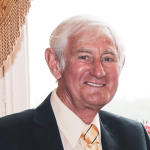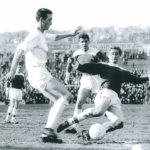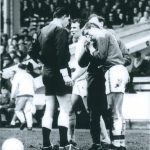
The widow of a North East football player – who became his carer after he developed dementia – has pledged to ensure his legacy will help protect future generations.
Former Middlesbrough star Bill Gates, who was England’s first £50-a-week player after signing to the club in 1961, passed away late last year aged 79.
He is believed to have had chronic traumatic encephalopathy (CTE) at the time – a progressive neurodegenerative disease uniquely associated with repetitive head impacts.
Now his widow, Dr Judith Gates, is working to raise awareness of sport-related brain injuries through the new Head Safe Football charity – which aims to reduce heading in football.

“Bill played at centre half, and heading is integral to that role. He often did 100 headers a day in training, and he trained almost every day,” said Judith, from Castle Eden.
“He had symptoms of what we now know as CTE while he was playing. He suffered with migraines throughout his football career, and retired just before he was 30 because of them.
“After he finished, he regularly said: ‘I’ll get dementia because of all those headers. I can see what’s happening to the generation ahead of me’. Very sadly, his prophecy became reality.”
Footballing dreams
Bill, the son of a miner, was born in Ferryhill and educated at Spennymoor Grammar School. At 16 he captained the England Youth Team and at 17 he signed for Middlesbrough.
Although football was his passion, Bill also had long-term plans beyond sport – and only agreed to turn professional if he could also study to become a chartered accountant.

He spent his entire footballing career at Middlesbrough, making more than 335 first team appearances between 1961 and 1974, before becoming an accountant and, later, a businessman.
In his mid-60s, however, Bill started showing symptoms of dementia and in 2017, following tests in the US, the presence of TAL TAU proteins were found – indicating CTE.
Bill later returned to England and, as the disease progressed, he was supported by our Trust. Judith cared for him until he eventually needed residential support.
“In the months before his death he was unable to walk, barely speaking, needed help eating and had to be lifted into a chair. But, very occasionally, we saw flashes of Bill,” said Judith.
“If we put a ball at his feet, he’d always kick it, even in his wheelchair he still kicked the ball. Having lost almost everything because of the game he loved, he still loved it.”
A legacy of safety
Bill passed away on October 21 last year – the same day as Bobby Charlton. Judith is determined his legacy will live on, however, by helping to pave the way for major changes in sport.
She and Head Safe Football are working to educate people on how to mitigate the risk of brain damage from repetitive head injuries, as well as the dangers of heading in football.

“Bill’s legacy is that he wanted us to do something to protect future players. We are not calling for a ban, but we advocate reducing heading, particularly in training,” said Judith.
“Some people think dementia is an old person’s disease. It isn’t. Bill never headed a ball seriously after 30 – all the damage to his brain was done when he was young man.
“There is also a misconception that balls in the old days were more dangerous. That’s just not true. The balls used today might not absorb water, but they are the same starting weight and are designed to go faster – so the impact is the same, if not greater, for today’s players.”
Solemn promise

Head Safe Football aims to encourage change by establishing a network of “trailblazers” in football at all levels – eventually creating a campaign which will be hard to ignore.
Judith made a solemn pledge to Bill before his death to help spread the word, and it is a promise she is determined to keep through her work for the charity.
“We have only got one brain, and we need to treat it properly,” she said. “Things aren’t cast in stone, change does happen, so why not change to protect people?”
- Find out more at Head Safe Football – CTE the elephant in the room